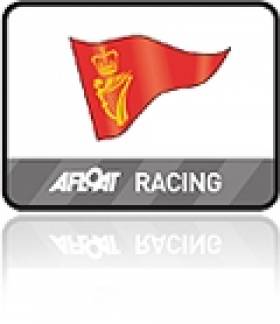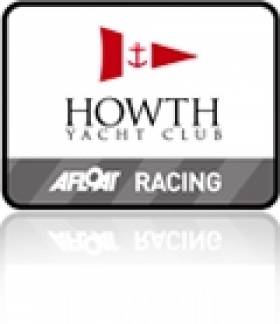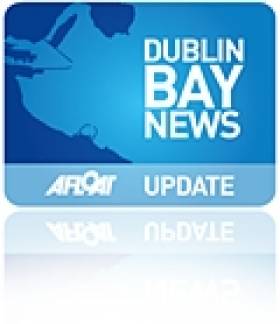Displaying items by tag: Dinghy Supplies
Corona Extra Takes SB20 Rankings Title for the 2014 Season
#sb20 – After the SB20 Midlands event in Lough Derg that was unfortunately blown out last weekend, the discard was applied to the 2014 results to decide overall rankings writes class president Justin Burke. Three points separated the top three teams after a season that saw four different regional event winners.
Being the only team to win two regionals, Dinghy Supplies (Daragh Sheridan, Shane Murphy & John Phelan) are sure to feel hard done by in missing out on the overall ranking by .67 of a point.
Corona Extra's (Graeme Grant, Ronan Downing, Tara Flood/ Breffni Jones) consistency pulled them through to take the title counting a 1st, 5th, 2nd and a 4th.Yachtsman.ie (Davy Taylor, Marty O'Leary, Lisa Neary & Rachel Williamson) edged third away from Shark Bait (Darren Martin,Roger Pannell & Simon Murray) by a single point.
Other than some frost-bite sailing out of the National Yacht Club (NYC) in November most SB's have been packed up for the winter.
The first Regional event planned for 2015 is the Easterns in Howth Yacht Club which will be preceded by the spring warmer out of the same club. This is sure to provide the fleet with some breezy conditions in preparation for the 2015 worlds which are being held on Lake Garda in early July. The fleet will be arranging a training event for any and all boats prior to the worlds in order to maximise the best results for the Irish competitors.
Over 10 Irish boats are currently planning on attending the worlds at one of Europe's premiers sailing venues. With the 2016 worlds already confirmed for Cascais, Ireland are lodging a strong bid and are hopeful in securing the 2017 worlds.
The remaining dates and locations for the 2015 Irish circuit will be published once they have been confirmed with the respective clubs.
Royal Cork Yacht Club to Revive Dinghy Week in 2015 As Eight Classes Express Interest
#rcyc – Royal Cork Yacht Club (RCYC) is eyeing up a return to the celebrated 'Dinghy Weeks' of thirty years ago after buoyant turnouts this season for a number of key open events including September's RS class Open and the CH Marine Optimist National Championships at the Munster Club. Afloat.ie reported on the prospect of the return of the famous format a month ago when a fleet of more than 40 RS400s, 200s and Fevas rounded off their season in Crosshaven on a high note with brilliant conditions for downwind surfing and upwind tactics that set a benchmark for the rekindled Dinghy Week idea.
According to a report in this morning's Irish Times, the Cork Harbour club has named the 2015 date and has interest from eight classes so far. RCYC Rear Admiral Kieran O'Connell told the newspaper 'The response has been massive in every fleet we've spoken to'.
It is understood August 21 to 23 are the dates selected and the event will be organised to national championship standard.
SB20 Midlands Regatta Won By 'Dinghy Supplies' Crew At Lough Ree Yacht Club
#sb20 – On a weekend of glorious late September weather a competitive fleet of 10 SB20's made the journey midland for the championships in the always welcoming environment of Lough Ree Yacht Club.
With the forecast pointing towards no wind on the Sunday race officer Geoff O' Donoghue made the decision to hold 4 races on the Saturday to ensure a full series would be raced.
Race 1 was started in unseasonally warm weather with winds of 10-15 knots. Dinghy Supplies helmed by Darragh Sheridan won the race with Alert Packaging helmed by Justin Burke second and Should Be... helmed by Michael O' Connor third. Race 2 was again won by Dinghy Supplies with Yachtsman.ie helmed by David Taylor second and Should Be... third. The third race completed a hat-trick of wins for Dinghy Supplies with Corona Extra helmed by Graeme Grant second and Yachtsman.ie third. The fourth race became a bit shiftier with places changing regularly Yachtsman.ie sailed well to come through to win with Alert Packaging second and Dinghy Supplies third.
At the end of the first days racing Dinghy Supplies were leading by 3 points from Yachtsman.ie second and Alert Packaging third. The class were treated to the hospitality of Lough Ree Yacht Club on the Saturday Night with a very enjoyable meal and some late night socilaising.
Sunday saw more wind than expected and race officer Geoff O, Donaghue took the fleet out for 2 races in lighter winds. It was going to turn out to be a day that demonstrated that no overall lead is safe within this fleet. Both Dinghy Supplies and Yachtsman.ie were seen as the strong front runners and both contrived to make it all go to the wire. Race 5 saw The Bear helmed by Kieran Dorgan win with Monkey helmed by Keith Cassidy second and Should Be.. third. With both Yachtsman.ie sixth and Dinghy Supplies eight the regatta was open to the last race. Race six saw 2 boats over at the start with Yachtsman.ie going straight back and Dinghy Supplies having to hoist gennaker to go back when their number was called a minute into the race. This led to a tense race in shifty conditions for the overall pace setters. Corona Extra sailed clever and won the race with Monkey capping off a well sailed day in tricky conditions with another second and Should Be.. capping off a consistent series with another third. Dinghy Supplies moved from dead last around the first mark to finish seventh and with Yachtsman.ie finishing sixth this meant it was enough for Dinghy Supplies to clinch the title by a point.
Overall it finished Dinghy Supplies first, Yachtsman.ie second and Should Be.. third. With The Bear winning the silver fleet.
Northside Dragon Wins in Howth
Jay Bourke's Etchell, Northside Dragon was the winner of tonight's Howth Yacht Club scratch race for the keelboat class. Second was Fetching, Quinn/O'Flaherty and third Simon Knowles' Jabberwocky. In the SB3s Gareth May's Investwise was first, Shane Murphy's Dinghy Supplies sceond and third was Shockwave (E.Quinlan).
HOWTH YACHT CLUB. TUE + SAT SERIES 1 10/05/2011 17 Footer SCRATCH: 1, Deilginis Deilginis Group; 2, Leila R Cooper; 3, Isobel B & C Turvey TUESDAY SERIES 1 Puppeteer SCRATCH: 1, Gold Dust Walls/Browne; 2, Mojo Stanley/Callen; 3, Enigma D Butler; Puppeteer HPH: 1, Gold Dust Walls/Browne; 2, Flycatcher D Wright; 3, Enigma D Butler; Squib SCRATCH: 1, Shadowfax P Merry; 2, Puffin E Harte; 3, Wasabi C & N Penlerick; Squib HPH: 1, Pegasus Smyth+Friends; 2, Shadowfax P Merry; 3, Puffin E Harte; Etchells SCRATCH: 1, Northside Dragon J Bourke; 2, Fetching Quinn/O"Flaherty; 3, Jabberwocky S Knowles; SB3 SCRATCH: 1, Investwise G May; 2, Dinghy Supplies S Murphy; 3, Shockwave E Quinlan
Sutton Dinghy Club to Stage Dublin Bay Sponsored Sail
Dublin bay's Sutton Dinghy Club is staging its first annual sponsored Sail between 3-6pm on 3rd July, a fundraising venture for a new rescue boat. The sail will follow a 10km route from the Dinghy Club down the creek to Dinghy Supplies on the Dublin Rd. More details on our forum here.




























































